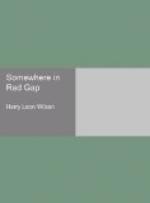“I may as well tell you here and now that C. Wilbur Todd is a shrimp. Shrimp I have said and shrimp I always will say. He talks real brightly in his way—he will speak words like an actor or something—but for brains! Say, he always reminds me of the dumb friend of the great detective in the magazine stories, the one that goes along to the scene of the crime to ask silly questions and make fool guesses about the guilty one, and never even suspects who done the murder, till the detective tells on the last page when they’re all together in the library.
“Sure, that’s Wilbur. It would be an ideal position for him. Instead of which he runs this here music store, sells these jitney pianos and phonographs and truck like that. And serious! Honestly, if you seen him coming down the street you’d say, ’There comes one of these here musicians.’ Wears long hair and a low collar and a flowing necktie and talks about his technique. Yes, sir, about the technique of working a machinery piano. Gives free recitals in the store every second Saturday afternoon, and to see him set down and pump with his feet, and push levers and pull handles, weaving himself back and forth, tossing his long, silken locks back and looking dreamily off into the distance, you’d think he was a Paderewski. As a matter of fact, I’ve seen Paderewski play and he don’t make a tenth of the fuss Wilbur does. And after this recital I was at one Saturday he comes up to some of us ladies, mopping his pale brow, and he says, ’It does take it out of one! I’m always a nervous wreck after these little affairs of mine.’ Would that get you, or would it not?
“So we go in the store and Wilbur looks up from a table he’s setting at in the back end.
“‘You find me studying some new manuscripts,’ he says, pushing back the raven locks from his brow. Say, it was a weary gesture he done it with—sort of languid and world-weary. And what you reckon he meant by studying manuscripts? Why, he had one of these rolls of paper with the music punched into it in holes, and he was studying that line that tells you when to play hard or soft and all like that. Honest, that was it!
“’I always study these manuscripts of the masters conscientiously before I play them,’ says he.
“Such is Wilbur. Such he will ever be. So I introduced him to Nettie and asked if he had this here song on a phonograph record. He had. He had it on two records. ’One by a barytone gentleman, and one by a mezzo-soprano,’ says Wilbur. I set myself back for both. He also had it with variations on one of these punched rolls. He played that for us. It took him three minutes to get set right at the piano and to dust his fingers with a white silk handkerchief which he wore up his sleeve. And he played with great expression and agony and bending exercises, ever and anon tossing back his rebellious locks and fixing us with a look of pained ecstasy. Of course it sounded better




